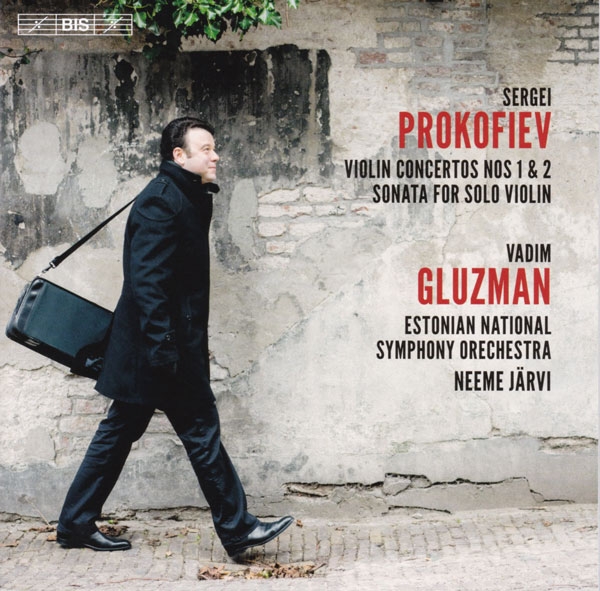| Columns Retired Columns & Blogs |
I want to thank ProStudioMasters for making the 24/96 hi-res files available to me. While my Rossini seems better optimized for SACD playback than files via USB stick, the sound quality is very, very good.

Gluzman's meaty and substantial tone is gorgeous throughout. He may lack the extremes of tenderness that some bring to the opening of the First Violin Concerto's first movement, but he gives us instead a rhapsodic account filled with subtlety and expertly recorded dynamic shifts. Prokofiev's characteristically Russian spikiness comes through loud and clear before the movement's end draws from Gluzman's instrument gorgeous, shimmering sounds that create palpable magic.
As the middle movement Scherzo begins its rollicking wild ride, Gluzman's playing reflects his obvious delight in Prokofiev's humor. (Many violinists play the movement in expert fashion, but without the joy that makes Gluzman's interpretation so winning.) When Prokofiev decides to march in militaristic fashion—the concerto, after all, was begun and completed during World War I and the start of the Russian Revolution—Gluzman arms himself with the best. When he transitions to the Moderato at the start of the final movement, initially rhapsodic writing leads the way to gorgeous lushness. Nothing stays the same for long in this concerto, as Prokofiev and Gluzman take us on a dazzling, kaleidoscopic roller coaster up and down the scale before depositing us in yet another mesmerizing landscape.
The Second Violin Concerto may start on a somewhat somber note, but it quickly begins to zip along in echt Prokofiev fashion. At approximately 6:05 into the first movement—that's an approximation because I only start staring at the time elapsed window on my dCS Rossini when a passage is so startling or unique that I involuntarily open my eyes in wonder—the violin rises high into its range over a delicious bass figure. Three minutes later, the movement ends surprisingly with pizzicato strings over a very deep bass. I can't tell you what the effect meant to Prokofiev on an emotional or spiritual level, but it certainly inspires amazement.
The middle movement Andante assai—Allegretto begins with a gorgeous, stately melody of great charm and tenderness. Gluzman's delicacy is lovely, and the soaring beauty of his playing supreme. His "voice" seems especially strong and confident and he embraces the beauty of this concerto with open arms and playing that gets even bigger boned as Prokofiev ups the ante. The oboe solo is captured with exceptional beauty and clarity as the movement grows even more exquisite than before.
The finale, marked Allegro ben marcato, grows wilder and wilder through its six minutes. The low percussive thwump at the end makes for one of those "wow" moments that will convince many an audiophile that all the time and energy they've devoted to their system is worth it.
The rarely performed Sonata in D Major for solo violin (1947) was composed as a student exercise, and was intended to be performed in unison by a bevy of violin pupils. First performed in public by Ruggiero Ricci after Prokofiev's death, the work soon transcends its potentially prosaic pedagogical pedigree by stint of its compelling variations and acrobatic ending.
While I listened to the stereo DSD layer of BIS's hybrid SACD—I do not have a 5.0 set-up—it's important to note that the original recording is in 24/96 format. That hi-rez PCM download is available from three different sites, two of which do business in the US. While I can't vouch for which format sounds superior—let's face it, all such conclusions are dependent in part upon a DAC's optimized sweet spot, if there is one, as well as the quality of the mastering and conversion software and the phases of the moon—I can say with certainty that I was so overwhelmed by Gluzman's playing and Prokofiev's genius that, even though I was in the midst of reviewing the D'Agostino Master Systems Progression monoblocks in my system, I kept getting lost in the beauty of the music and forgetting to write down much more than an extended series of structural observations and "wows." In fact, I had to listen twice before I could begin to find words to describe the total immersion experience that this performance inspires.

I want to thank ProStudioMasters for making the 24/96 hi-res files available to me. While my Rossini seems better optimized for SACD playback than files via USB stick, the sound quality is very, very good.

for the excellent review. Would be great to see more in depth reviews like this for all types of music. Including stuff that used to be reviewed by that young guy who liked really off the wall stuff like 'Oneohtrix Point Never' but isn't with Stereophile any more.

... that old guy who absolutely positively assures you that the young guy - Stephen Mejias of AudioQuest - would go wild for Eighth Blackbird's Hand Eye http://www.stereophile.com/content/hand-eye-wigs-out#8Ku4IADDjPUkrTEz.97, the Andrew Norman percussion piece for Colin Currie on the Reference Recordings Utah Symphony Anniversary disc http://www.stereophile.com/content/sonic-spectacular-utah#Y8YoqVO8SAqqiSjA.97, and the Four Four Three Terry Riley disc http://www.stereophile.com/content/terry-rileys-music-its-most-sensational#oVJiFqVyv2D8hB4e.97 I've reviewed. I realize none of these are "alt-pop," but they do exist in that new, genre-bending realm where classical, rock, pop, and even jazz intersect and cross-pollinate. They, like a lot of the music Stephen reviewed, really grab you viscerally. And, because of their multi-layered reality, they also make you think.

And I suspect you're younger than me. I listen mostly to classical--Stravinsky, Bartok, Bruckner, Shostakovich, all of it--but any kind of interesting instrumental stuff I can go for too--even Stephen's Oheohtrix Point Never. Too bad he's not with Stereophile anymore. I'll check out your recommendations.

On your recommnd, downloaded from
Prostudiomasters and listening as I type.
Always trust your recommendations.
Best,
Warren

Much appreciated. Now we'll see if my next review elicits praise or calls for my head on a platter. I ain't sayin' more.

Excellent- as always-JVS.